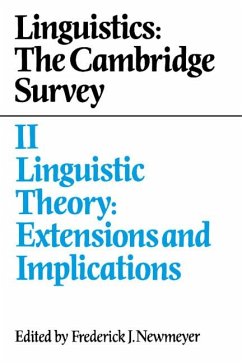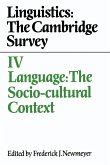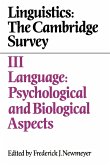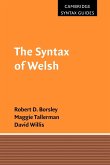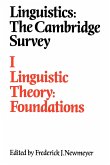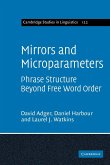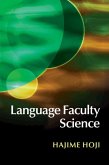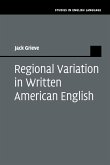Linguistics: The Cambridge Survey is a comprehensive introduction to current research in all branches of the field of linguistics, from syntactic theory to ethnography of speaking, from signed language to the mental lexicon, from language acquisition to discourse analysis. Each chapter has been written by a specialist particularly distinguished in his or her field who has accepted the challenge of reviewing the current issues and future prospects in sufficient depth for the scholar and with sufficient clarity for the student. Each volume can be read independently and has a particular focus. Volume I covers the internal structure of the language faculty itself, while Volume II considers the evidence for, and the implications of, a generativist approach to language. Psycholinguistics and neurolinguistics are covered in Volume III, and Volume IV concentrates on sociolinguistics and the allied fields of anthropological linguistics and discourse and conversation analysis. Several of the chapters in the work concentrate on the interface between different aspects of linguistic theory or the boundaries between linguistic theory and other disciplines. Thus in both its scope and in its approach the Survey is a unique and fundamental work of reference. It undoubtedly fulfils the editor's principal aim of providing a wealth of information, insight and ideas that will excite and challenge all readers with an interest in linguistics.
Table of contents:
Preface; 1. Extensions and implications of linguistic theory: an overview Frederick J. Newmeyer; 2. Grammar and language processing Lyn Frazier; 3. Grammatical principles of first language acquisition: theory and evidence Thomas Roeper; 4. Second language acquisition and grammatical theory Suzanne Flynn; 5. Brain structures and linguistic capacity Mary-Louise Kean; 6. Abnormal language acquisition and the modularity of language Susan Curtiss; 7. Grammatical aspects of speech errors Victoria A. Fromkin; 8. Grammar and conversational principles Ruth Kempson; 9. Discourse analysis: a part of the study of linguistic competence Ellen F. Prince; 10. Speech act distinctions in grammar Jerrold M. Sadock; 11. Computer applications of linguistic theory Per-Kristian Halvorsen; 12. Metrics and phonological theory Bruce Hayes; 13. Grammatical theory and signed languages Carol A. Padden; 14. Creole languages and the bioprogram Derek Bickerton; 15. Are creoles a special type of language? Pieter Muysken; 16. A dialog concerning the linguistic status of creole languages Derek Bickerton and Pieter Muysken; Subject index; Name index.
Hinweis: Dieser Artikel kann nur an eine deutsche Lieferadresse ausgeliefert werden.
Table of contents:
Preface; 1. Extensions and implications of linguistic theory: an overview Frederick J. Newmeyer; 2. Grammar and language processing Lyn Frazier; 3. Grammatical principles of first language acquisition: theory and evidence Thomas Roeper; 4. Second language acquisition and grammatical theory Suzanne Flynn; 5. Brain structures and linguistic capacity Mary-Louise Kean; 6. Abnormal language acquisition and the modularity of language Susan Curtiss; 7. Grammatical aspects of speech errors Victoria A. Fromkin; 8. Grammar and conversational principles Ruth Kempson; 9. Discourse analysis: a part of the study of linguistic competence Ellen F. Prince; 10. Speech act distinctions in grammar Jerrold M. Sadock; 11. Computer applications of linguistic theory Per-Kristian Halvorsen; 12. Metrics and phonological theory Bruce Hayes; 13. Grammatical theory and signed languages Carol A. Padden; 14. Creole languages and the bioprogram Derek Bickerton; 15. Are creoles a special type of language? Pieter Muysken; 16. A dialog concerning the linguistic status of creole languages Derek Bickerton and Pieter Muysken; Subject index; Name index.
Hinweis: Dieser Artikel kann nur an eine deutsche Lieferadresse ausgeliefert werden.

